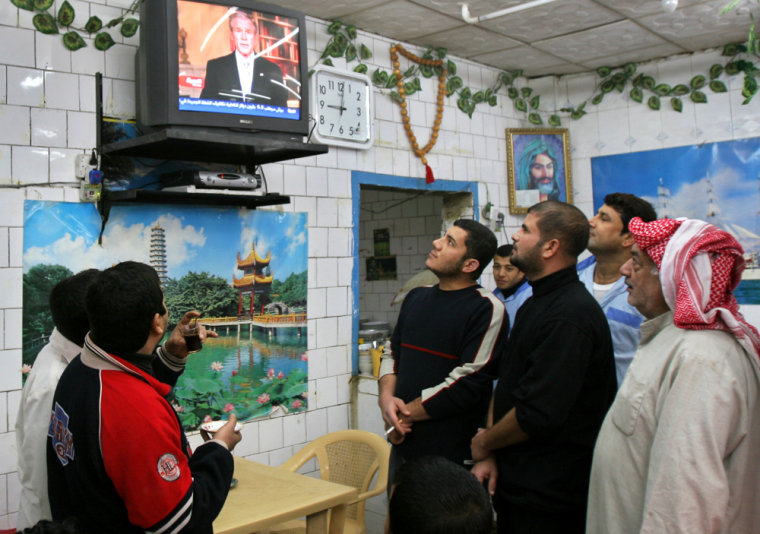Iraq’s government welcomed President Bush’s new strategy and promised it was committed to making sure it succeeds. But ordinary Iraqis gave it mixed reviews, with many expressing skepticism that an increase in U.S. troops would quell the violence ransacking their country.
A Sunni lawmaker also rejected Bush’s plan to send more troops, calling instead for a timetable for them to withdraw and for direct negotiations with insurgents.
“Bush’s plan could be the last attempt to fix the chaos created after the invasion of Iraq. Yet, sending more troops will not end the problem, on the contrary, there will be more bloodshed,” said Sunni lawmaker Hussein al-Falluji.
In a speech broadcast live on Iraqi state television, Bush said he was increasing U.S. troops by 21,500 — 17,500 to Baghdad, where much of the sectarian violence has been blamed on predominantly Shiite militias. The plan also envisions 10,000 to 12,000 Iraqi troops to secure Baghdad’s neighborhoods.
“The failure in Iraq will not only affect this country only but the rest of the region and the world, including the United States,” said Sadiq al-Rikabi, an adviser to Iraqi Prime Minister Nouri al-Maliki said.
“The current situation is not acceptable — not only for the American people but also for the Iraqis and their government. As Iraqis and as an elected government we welcome the American commitment for success,” he added. “The Iraqi government also is committed to succeed.”
He also stressed the importance of the Iraqis taking the lead in military operations.
“The American plan cannot succeed without us because we work in the same field in order to defeat violence and terrorism and boost the democratic system,” he said.
‘More wasted blood’
Baghdad residents from both sects, however, said they were not optimistic that Bush’s new strategy would end the Sunni-Shiite attacks that have spiraled in the capital and elsewhere since a Feb. 22 bombing of a revered Shiite shrine in Samarra. Others offered a weary acceptance of any effort to curb the violence after several failed past attempts.
Osama Ahmed, a 50-year-old Sunni who works in the Ministry of Higher Education, said he got up early to watch the speech, which aired at 5 a.m. Thursday in Iraq.
“More U.S. troops will mean more wasted blood and more people killed,” Ahmed said. “The violence will surge unless U.S. administration decides to curb militiamen who are part of the Iraqi government.”
He accused the Shiite-dominated government of backing the militias in attacking Sunnis, saying “there is no point of giving more security responsibilities to the Iraqi government because it is a sectarian government and it is responsible for the violence hitting the country.”
Abdel-Karim Jassim, a 44-year-old Shiite trader, said he had hoped Bush would come up with something other than the troops increase.
“Sending more troops will not solve the problem,” he said, although he acknowledged that “Iraqis cannot handle security issue on their own because of the sectarian divisions and the strong militias and insurgents.”
Rahim al-Waeli, a Shiite, said the Iraqi security forces need to be freed from the influence of political parties. But the 40-year-old Shiite employee in the Health Ministry was hopeful this plan would succeed where others had failed because it included efforts to boost economic aid and job creation.
“I am relatively optimistic because this time the plan is not only about using force, it has some economical and service aspects,” he said.
Shiite politician and former member of parliament Mariam al-Rayes also welcomed the new effort but noted Democratic opposition in the United States to the increase in troops.
“Some consider president Bush an adventurer,” she told the state-run Iraqiya station. “But he has found that his role now is to support this government especially after the government asked for more support and authorities.”
‘The last chance’
In the past, the Iraqi government has tried to prevent American military operations against the Mahdi Army, the militia loyal to radical Shiite cleric Muqtada al-Sadr, while giving U.S. forces a free hand against Sunni militants. The Bush administration has pushed al-Maliki to curb his militia allies or allow U.S. troops to do the job.
Senior officials in al-Sadr’s group said they will not comment on the speech until their political council meets later Thursday to discuss Bush’s statements.
University professor Hafidh Issam, 49, said the United States had made many mistakes in Iraq and accused it of contributing to the chaos to serve its own interests in the Middle East.
“They built a constant base in Iraq that would be able to threaten the neighboring countries, especially Iran and the Gulf countries,” Issam said.
Awad Mukhtar, a 35-year-old technician, said Bush’s new proposals could be Iraq’s “last chance” for peace.
“The security situation in Iraq is very bad, we are facing death at any moment daily,” Mukhtar said. “I see the new Bush strategy as the last chance for Iraqis to save their lives ... we have no other choice, only to wait and see the results.”
